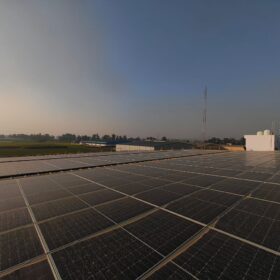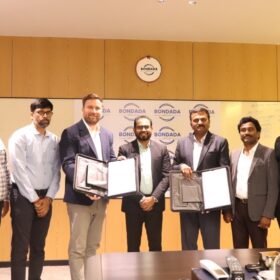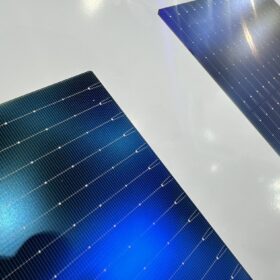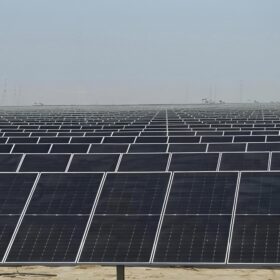The Seventh Meeting of the International Solar Alliance (ISA) Regional Committee for Latin America and the Caribbean (LAC) opened this morning in Santiago, Chile, signalling renewed commitment to deepening solar cooperation and accelerating clean energy transition across the Region.
Welcoming the delegates, H.E. Diego Pardow Lorenzo, Minister of Energy of Chile, the host country, reaffirmed their support for ISA’s mission to deliver affordable solar solutions and expand regional partnerships. “Latin America’s future lies in a diversified energy matrix. In Chile, our journey from hydro-dependence to solar leadership has shown that clean energy, supported by long-term contracts and private investment, can lower costs, boost resilience, and empower communities. Our focus now is on extending solar operational hours through storage and ensuring the benefits reach our most vulnerable households. We believe regional cooperation is essential—only together can we scale technologies, share knowledge, and secure a competitive, sustainable energy future for our people.”
H.E. Kerryne Zennelle James, Minister for Climate Resilience, the Environment and Renewable Energy, Grenada, chaired the meeting in her official capacity as the Vice President of the ISA LAC Region, calling for strong regional leadership to translate solar ambition into action. In her opening statement, she noted, “Latin America and the Caribbean are global leaders in renewable energy, with 65% of our power already sourced from renewables—double the global average. But the path ahead is uneven, especially for small island states like Grenada. We are committed to a clean, resilient future through clear national policies, ongoing solar deployments, and strong partnerships. ISA’s strategic shift from ambition to action is timely, and this Regional Committee is a crucial platform to align our priorities and unlock collective progress.”
H.E. Abhilasha Joshi, Ambassador of India to Chile and representative of the ISA Assembly Presidency, spoke of India’s long-standing support for ISA and its commitment to South-South cooperation for sustainable energy. Spotlighting the recent achievements of the country, she said, “With 116 GW of solar capacity and renewable energy targets of 50% of capacity from renewables set for 2030 being met five years ahead of schedule, we are working closely with partners across Latin America and the Caribbean to share solutions, catalyse finance, and drive innovation in solar energy. Together, through ISA, we can align regional priorities, promote joint R&D, and build a resilient and sustainable energy future.”
Director General of ISA, Mr Ashish Khanna, in his address, outlined the strategic relevance of the LAC region in the global solar landscape and shared ISA’s vision to anchor its support around four key pillars: mobilising catalytic finance, strengthening institutional capacities, enabling regional platforms, and scaling innovation and solar technologies. He said, “With 26 countries now part of ISA in the LAC region—a 50% rise since 2021—the momentum is clear. With 9 Caribbean countries agreeing to sign a joint declaration on SIDS—to work together on an aggregate e-procurement platform, establish a regional Centre of Excellence within the Organization of Eastern Caribbean States (OECS), announce the winners of the LAC SolarX Startup Challenge at COP30 in Belém, and deepen the partnership to enable private sector participation in the region through an MoU with the Latin American Energy Organization (OLADE)—this presents a concrete vision and action plan for the LAC region. This is a clear shift from ambition to action.”
Key outcomes and announcements:
· Country Partnership Framework exchange between ISA and Grenada: The Country Partnership Framework will provide a structured approach for ISA and Grenada to collaborate on solar energy initiatives and support Grenada’s clean energy transition – areas of collaboration will include strategic planning, regulatory support, technology development, capacity building, and solar deployment. The first CPF for the region was signed between ISA and Cuba earlier this year in New Delhi, India.
· Pledge of Support adopted by leaders from Small Island Developing States (SIDS) for the ISA SIDS Platform: a transformative digital initiative anchored by the International Solar Alliance and the World Bank, aimed at accelerating inclusive, climate-resilient energy access across island nations. Nine Caribbean countries – Antigua & Barbuda, Belize, Dominica, Dominican Republic, Grenada, Saint Lucia, Saint Kitts & Nevis, Suriname, and Trinidad & Tobago – signed a Declaration of Intent at the 7th ISA Regional Committee Meeting to launch the SIDS Solar Platform. The platform will boost solar adoption through joint procurement, lower costs, and build regional capacity—advancing clean energy and resilience across island nations.
· ISA and the Latin American Energy Organization (OLADE) have extended their Memorandum of Understanding—reinforcing a shared commitment to accelerate solar deployment across the LAC region. The renewed partnership focuses on mobilising climate-aligned financing through platforms like the Global Solar Facility; building technical capacity via regional trainings, peer learning, and data sharing; harmonising policies and co-developing solar applications—across agriculture, mobility, mini-grids, and storage; and supporting national planning through joint workplans, working groups, and outreach forums.
· ISA and the Organisation of Eastern Caribbean States (OECS) signed a strategic MoU to advance solar energy deployment across the region. This partnership will focus on expanding energy access and resilience through solar, supporting small island states with capacity-building and technical assistance, unlocking catalytic finance for solar projects, and driving policy harmonisation and knowledge exchange. Together, ISA and OECS aim to accelerate a sustainable, secure energy future for the Eastern Caribbean.
· ISA is currently hosting the third edition of the SolarX Startup Challenge 2025 for the Latin America and Caribbean (LAC) region, building on successful editions in Africa and the Asia-Pacific and accepting applications till 15 August 2025. The Challenge seeks innovative, scalable, and cost-effective solar solutions that address local energy challenges. It aims to foster entrepreneurship, strengthen local ecosystems, and build capacity to accelerate solar adoption across the LAC region.
In his keynote address, H.E. Paulo Roberto Soares Pacheco, Brazilian Ambassador to Chile and representative of the incoming COP30 Presidency, highlighted that access to clean, reliable, and affordable energy is inseparable from the fight against climate change and the path to sustainable development. He welcomed ISA’s efforts to scale solar solutions in LDCs and SIDS, stressing that energy access and affordability are essential for human development—especially for those most vulnerable.
He called for global solidarity, noting: “In Brazil, we use the word ‘mutirão’ to describe a collective effort—where communities, governments, and institutions come together to solve challenges through shared responsibility. That is precisely what we are calling for at the global level—a global mutirão—to accelerate the energy transition through joint action and solidarity across borders.”
About the ISA Regional Committee for Latin America and the Caribbean
The Regional Committees of the ISA meet annually, chaired by two Vice-Presidents from the Region, and aim to assess and discuss progress, challenges, and opportunities related to ISA’s programmatic support, flagship initiatives, partnerships, private sector engagements, and work plan for the Region. A significant goal of the Regional Committee Meetings is smooth coordination among the Region’s Member Countries. At present, 26 countries – 23 Members and 3 Signatories – are part of ISA from the Region, namely: Antigua and Barbuda, Barbados, Belize, Venezuela, Dominica, Guyana, Brazil, Grenada, Jamaica, Argentina, Chile, Cuba, El Salvador, Haiti, Nicaragua, Panama, Paraguay, Peru, Suriname, Trinidad and Tobago, Saint Kitts and Nevis, Saint Lucia, Saint Vincent and the Grenadines, Dominican Republic, Bolivia and Costa Rica.
About the International Solar Alliance
The International Solar Alliance is a global initiative launched in 2015 by India and France at COP21 in Paris. It has 124 Member and Signatory Countries. The Alliance works with governments to improve energy access and security worldwide and promotes solar power as a sustainable transition to a clean energy future.
ISA’s mission is to unlock investments in solar energy while reducing the cost of technology and financing it. It promotes the use of solar energy in agriculture, healthcare, transportation, and power generation sectors. ISA Member Countries are driving change by enacting policies and regulations, sharing best practices, agreeing on common standards, and mobilising investments. Through this work, ISA has identified, designed and tested new business models for solar projects; supported governments to make their energy legislation and policies solar-friendly through Ease of Doing Solar analytics and advisory; pooled demand for solar technology from different countries; and drove down costs; improved access to finance by reducing the risks and making the sector more attractive to private investment; increased access to solar training, data and insights for solar engineers and energy policymakers.
With its advocacy for solar-powered solutions, ISA aims to transform lives, bring clean, reliable, and affordable energy to communities worldwide, fuel sustainable growth, and improve quality of life. On 6 December 2017, 15 countries signed and ratified the ISA Framework Agreement, making ISA the first international intergovernmental organisation headquartered in India. ISA is partnering with multilateral development banks (MDBs), development financial institutions (DFIs), private and public sector organisations, civil society, and other international institutions to deploy cost-effective and transformational solutions through solar energy, especially in the least Developed Countries (LDCs) and the Small Island Developing States (SIDS).





